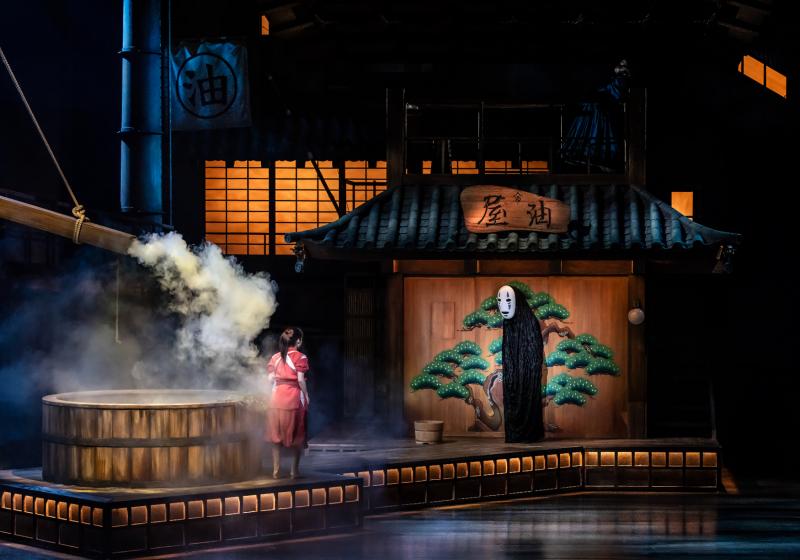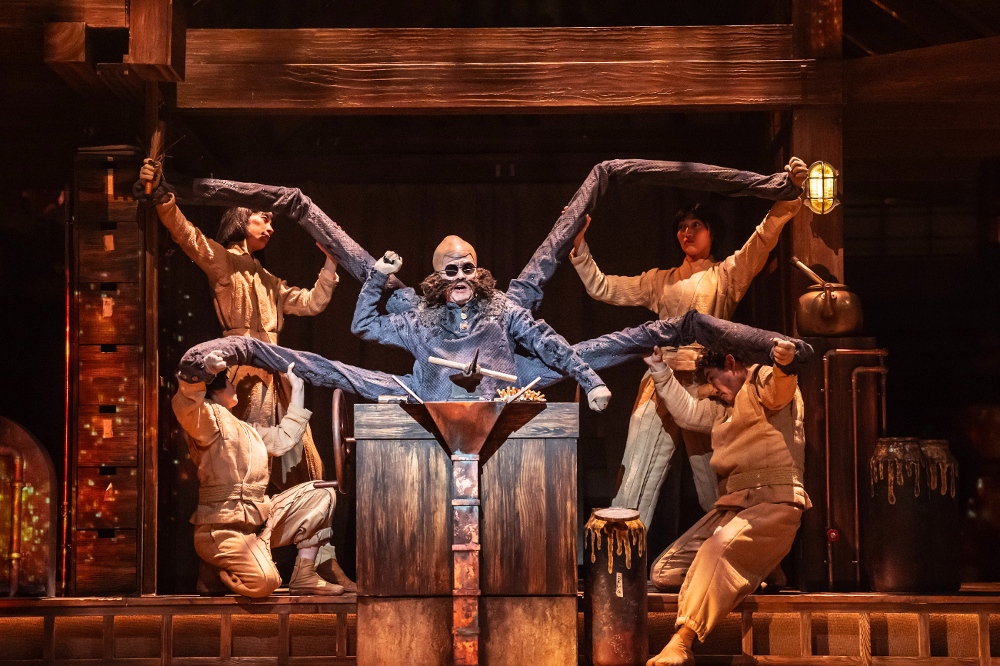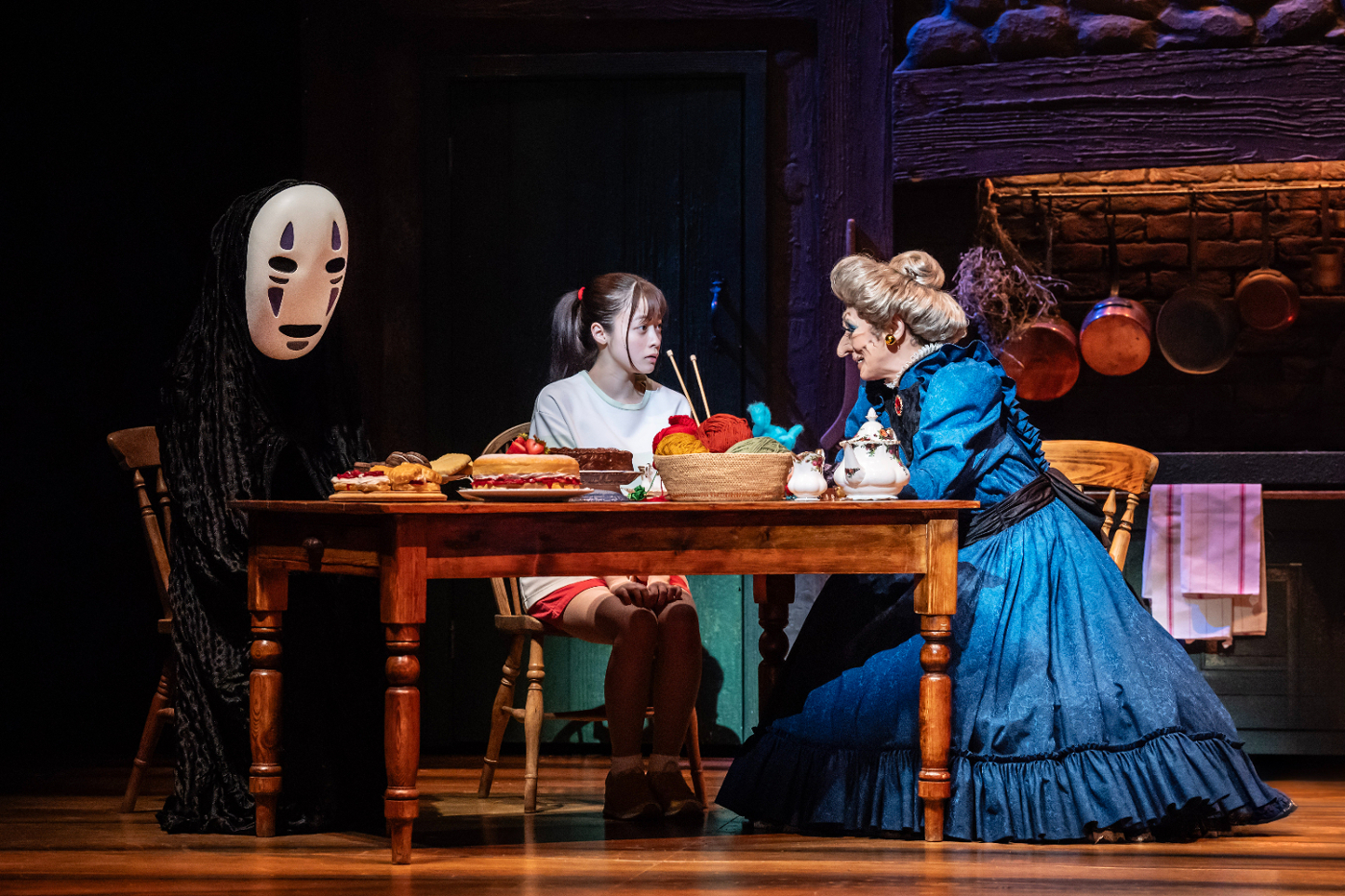Spirited Away, London Coliseum review - spectacular re-imagining of beloved film | reviews, news & interviews
Spirited Away, London Coliseum review - spectacular re-imagining of beloved film
Spirited Away, London Coliseum review - spectacular re-imagining of beloved film
Growing up with Chihiro/Sen is overwhelming, enlightening and beautiful

Legions of Ghibli fanatics may love the heartwarming My Neighbour Totoro and the heartbreaking Grave of the Fireflies, but they revere Spirited Away, their, our, The Godfather and The Wizard of Oz rolled into one.
Totoro has been magnificently staged in London, setting the bar high, but it’s a simpler story, a simpler aesthetic and it’s obviously an easier gig to adapt a great film rather than an all-time great film, first winner of the Academy Award for Best Animated Feature. Waiting for the curtain, I gulped back contradictory thoughts: I was so excited about them getting it right and so fearful of them getting it wrong. Well…
After a slightly underwhelming opening with a mocked-up car and video projection, although it did foreshadow Kanna Hashimoto’s uncanny ability to mimic the movements of animated Chihiro/Sen, so crucial for character development, there’s a sharp intake of breath as her parents are transformed into pigs. “Yeah, they get it flashed” through most minds in the packed house. It's not an easy watch. The play will land differently with those familiar with these characters who refuse to comply with western traditions of goodies and baddies, who are unpredictable, generous one moment, vindictive the next. It’s often wise to read a synopsis of an unfamiliar opera or a Shakespeare before taking one’s seat and it’s advisable here too. Get a handle on the who and the what, and that will allow the nuances of the why to emerge. Director, John Caird, has many operas on his CV and it’s probably wise to treat this production as an opera without the singing.
It's not an easy watch. The play will land differently with those familiar with these characters who refuse to comply with western traditions of goodies and baddies, who are unpredictable, generous one moment, vindictive the next. It’s often wise to read a synopsis of an unfamiliar opera or a Shakespeare before taking one’s seat and it’s advisable here too. Get a handle on the who and the what, and that will allow the nuances of the why to emerge. Director, John Caird, has many operas on his CV and it’s probably wise to treat this production as an opera without the singing.
On the surface, it’s a straightforward coming-of-age story – petulant tween finds herself in peril, falls in love and learns about an adult world at once seductive and dangerous. Hayao Miyazaki had done something similar with earlier films like Kiki’s Delivery Service and Princess Mononoke, but he deepened his analysis of his obsessions in his masterpiece.
As soon as Chihiro is saved, she is told that she must work, moreover, must demand work, as it is only through work that she can carve a place in an alien, hostile world. She meets the spidery boilerman, Kamaji (Tomorowo Taguchi, pictured above) who, like so many of the strange humanoid creatures she encounters, is initially hostile, but the girl shows she is serious and gains his respect.
She assumes duties in the bathhouse for the spirits, finding a place amongst the maids charged with maintaining Japanese levels of cleanliness. She is not welcomed by the young women nor by the male and frog supervisors, but, pairing up with Lin (Fu Hinami) she works hard and, if she’s not quite accepted, she’s tolerated. She also looks and moves like a woman and not the kid lolling on the backseat of her parents’ car - growing up has come with a jolt.
The three key "people" of her life in the spirit world begin to shape her character. Haku (Kotaro Daigo) is the boy who gave her the food that prevented her disappearing like a will-o-the-wisp. He’s beautiful and troubled and she senses a past connection with him, So it proves.
Yubaba and Zeniba (Mari Natsuke, pictured below with Kanna Hashimoto and Hikaru Yamano) are the twin witches who rule their rival bathhouses (I nearly wrote “... the twin madames who…, but you can make your own mind up about that) and though Yubaba never quite loses her hostility towards the human interloper, her homely sister is warm. Yubaba steals names as a means of controlling her workers, transforming the girl Chihiro into the woman Sen, underlining how closely identity and self-respect are connected to language, but Zeniba only brings out the best in her charges.
 Neverthless, just as we were all waiting for the bus stop scene at the Barbican’s Totoro, we were all waiting for the introduction of No-Face, the most complex of all the spirits Chihiro meets. Working with Noh mask above a black shroud, Hikaru Yamano moves with the ethereal grace of a ballet dancer, vesting the child-like spirit with the deepest emotions - loneliness, hope, fear, longing, malevolence, spite, acceptance and, most of all, love. It’s so hard to get No-Face right, as he is defined by what he sees not who he is, reflecting most of the seven deadly sins that he encounters. That said, he is not twee, not innocent, not knowing and not a victim, despite his desperate desire for affection. It is very moving when he finds it, albeit presented in a typically unsentimental way. I doubt I’ll see a more subtle performance this year.
Neverthless, just as we were all waiting for the bus stop scene at the Barbican’s Totoro, we were all waiting for the introduction of No-Face, the most complex of all the spirits Chihiro meets. Working with Noh mask above a black shroud, Hikaru Yamano moves with the ethereal grace of a ballet dancer, vesting the child-like spirit with the deepest emotions - loneliness, hope, fear, longing, malevolence, spite, acceptance and, most of all, love. It’s so hard to get No-Face right, as he is defined by what he sees not who he is, reflecting most of the seven deadly sins that he encounters. That said, he is not twee, not innocent, not knowing and not a victim, despite his desperate desire for affection. It is very moving when he finds it, albeit presented in a typically unsentimental way. I doubt I’ll see a more subtle performance this year.
Caird, an Olivier and two Tonys on his mantelpiece, directing and adapting (with Maoko Imai) shows great loyalty to his source material and avoids the traps of pastiche and impersonation. Though the puppetry and costumes are visually stunning, we never lose sight of the fact that we are watching a stage show and not a whizzbang hybrid of CGI and live action. The unique aesthetic is honoured.
Crucial to that outcome is Joe Hisaishi’s music that lends a specifically Japanese otherness to the production. It is a delight to hear it played by a live orchestra (few expenses are spared and though ticket prices are high, you can see where the money goes) and the aural callbacks to the movie prove as powerful as the visuals.
Spirited Away is in every sense a big show. The sets fill one of the largest stages in London, the cast of each evening is multitudinous (and there are rotations for the leads) and the demands it makes on its audience to deal with Miyazaki’s approach to storytelling are also considerable. Fortunately, with the original Tokyo cast, Japanese is the spoken language – if anyone has seen the dubbed Ghibli films, you’ll know how that jars – so you're also reading surtitles for three hours.
Ultimately, as with opera, going through the tunnel with Chihiro, learning alongside her as she is named Sen and emerging older and wiser is the key to appreciating this landmark production. I have seen how this journey plays out with my own children at different ages and also in myself – not everybody will get that, and that’s fine. For those who do, there’s nothing that compares.
rating
Explore topics
Share this article
Subscribe to theartsdesk.com
Thank you for continuing to read our work on theartsdesk.com. For unlimited access to every article in its entirety, including our archive of more than 15,000 pieces, we're asking for £5 per month or £40 per year. We feel it's a very good deal, and hope you do too.
To take a subscription now simply click here.
And if you're looking for that extra gift for a friend or family member, why not treat them to a theartsdesk.com gift subscription?
more Theatre
 Fawlty Towers: The Play, Apollo Theatre review - lightning strikes twice
John Cleese's sitcom masterpiece makes seamless transition to the stage
Fawlty Towers: The Play, Apollo Theatre review - lightning strikes twice
John Cleese's sitcom masterpiece makes seamless transition to the stage
 People, Places and Things, Trafalgar Theatre review - a scintillating shot in the arm
Duncan MacMillan’s riotous reflection on addiction and recovery returns
People, Places and Things, Trafalgar Theatre review - a scintillating shot in the arm
Duncan MacMillan’s riotous reflection on addiction and recovery returns
 Withnail and I, Birmingham Rep review - Bruce Robinson’s 1987 film makes for a theatrical hit
Withnail and Marwood fix up the Jag and head for Birmingham
Withnail and I, Birmingham Rep review - Bruce Robinson’s 1987 film makes for a theatrical hit
Withnail and Marwood fix up the Jag and head for Birmingham
 Sappho, Southwark Playhouse Elephant review - a glitzy celebration of sapphic love
Too much camp and not enough content in this tribute to the Greek poet
Sappho, Southwark Playhouse Elephant review - a glitzy celebration of sapphic love
Too much camp and not enough content in this tribute to the Greek poet
 Twelfth Night, Regent's Park Open Air Theatre review - burlesque overwhelms the darker notes in this mixed revival
Queer themes and music take centre stage in a café setting
Twelfth Night, Regent's Park Open Air Theatre review - burlesque overwhelms the darker notes in this mixed revival
Queer themes and music take centre stage in a café setting
 Multiple Casualty Incident, The Yard Theatre review - NGO medics in training have problems of their own
Sami Ibrahim's play examines ethics in a war zone, but pivots to a gimmicky love story
Multiple Casualty Incident, The Yard Theatre review - NGO medics in training have problems of their own
Sami Ibrahim's play examines ethics in a war zone, but pivots to a gimmicky love story
 Spirited Away, London Coliseum review - spectacular re-imagining of beloved film
Growing up with Chihiro/Sen is overwhelming, enlightening and beautiful
Spirited Away, London Coliseum review - spectacular re-imagining of beloved film
Growing up with Chihiro/Sen is overwhelming, enlightening and beautiful
 Laughing Boy, Jermyn Street Theatre review - impassioned agitprop drama
Strong ensemble work highlights the plight of people with learning disabilities
Laughing Boy, Jermyn Street Theatre review - impassioned agitprop drama
Strong ensemble work highlights the plight of people with learning disabilities
 Minority Report, Lyric Hammersmith Theatre review - ill-judged sci-fi
Philip K Dick’s science fiction short story fares far better on screen
Minority Report, Lyric Hammersmith Theatre review - ill-judged sci-fi
Philip K Dick’s science fiction short story fares far better on screen
 Two Strangers (Carry A Cake Across New York), Criterion Theatre review - rueful and funny musical gets West End upgrade
A Brit and a New Yorker struggle to find common ground in lively new British musical
Two Strangers (Carry A Cake Across New York), Criterion Theatre review - rueful and funny musical gets West End upgrade
A Brit and a New Yorker struggle to find common ground in lively new British musical
 Testmatch, Orange Tree Theatre review - Raj rage, old and new, flares in cricket dramedy
Winning performances cannot overcome a scattergun approach to a ragbag of issues
Testmatch, Orange Tree Theatre review - Raj rage, old and new, flares in cricket dramedy
Winning performances cannot overcome a scattergun approach to a ragbag of issues
 Banging Denmark, Finborough Theatre review - lively but confusing comedy of modern manners
Superb cast deliver Van Badham's anti-incel barbs and feminist wit with gusto
Banging Denmark, Finborough Theatre review - lively but confusing comedy of modern manners
Superb cast deliver Van Badham's anti-incel barbs and feminist wit with gusto

Add comment